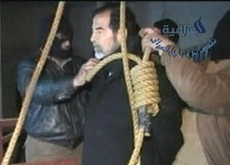
Saddam death draws mixed reactions

Saddam Hussein's execution has provoked mixed reactions around the world and focused attention on differing attitudes towards capital punishment.
Switzerland, like a number of other European countries, condemned the serious crimes committed by Saddam Hussein, but disapproved of the use of the death penalty, calling it “unjustifiable”.
The former Iraqi president, who was captured in December 2003 by American soldiers, was hanged at dawn on Saturday in northern Baghdad following his conviction by an Iraqi court for crimes against humanity.
In a statement, the Swiss foreign ministry reiterated its firm opposition to the death penalty.
“For Switzerland the death penalty cannot be justified, even for the most serious of crimes. This fundamental position also applies for the case of Saddam Hussein,” it declared.
It added that Switzerland remains “extremely concerned” by the dramatic insecurity in Iraq and hopes that the Iraqis can “overcome past challenges” and find ways of “ensuring peaceful reconciliation and of building a democratic society”.
Milestone
In a prepared statement, George Bush cautioned that Saddam’s execution would not stop the violence in Iraq but said it was “an important milestone on Iraq’s course to becoming a democracy that can govern, sustain and defend itself, and be an ally in the war on terror”.
The office of the Iraqi prime minister, Nuri al-Maliki, said Saddam’s execution was a “strong lesson” to ruthless leaders who commit crimes against their own people and called on Saddam’s Sunni Ba’athist followers to end their insurgency. Its neighbour Iran welcomed his execution as a “victory for the Iraqis”.
But for Bush’s allies in Europe, where the death penalty is outlawed, the execution made for uncomfortable viewing.
“You don’t fight barbarism with acts that I deem as barbaric,” said Louis Michel, a member of the European Commission.
Anti-death penalty
While all European Union countries oppose the death penalty, key figures in the region were careful not to appear to be pardoning the dictator or criticising Iraqi and US policy.
“The EU condemns the crimes committed by Saddam. The EU condemns also the death penalty,” said a spokesman for the bloc’s foreign policy chief Javier Solana.
Britain, Washington’s closest ally in Iraq, said although it opposed capital punishment, it was Iraq’s sovereign right to apply the penalty.
France, which opposed the US intervention in Iraq, avoided either condoning or criticising the hanging. In a statement, it “took note” of the execution but stressed its opposition to the death penalty.
“The German government has always said that there are no doubts whatsoever about Saddam’s crimes. But we are opposed to the death penalty, no matter where it is used,” Berlin said.
London-based rights group Amnesty International said the execution was wrong in principle and also because Saddam’s trial was flawed.
Arab world
In Iraq Saddam’s execution was welcomed by Shi’ites and Kurds, who were oppressed under his rule, but many in the once dominant Sunni Arab minority were angry and all sides feared it could spark even more violence.
His death was followed by reports of four car bomb attacks targeting Shi’ites in Baghdad and a town south of the capital, killing more than 70 people.
While many Arab governments refrained from comment, a senior aide to Arab League Secretary-General Amr Moussa called the execution “a tragic end to a sad phase in Iraq’s history”.
Many Arabs also criticised the provocative timing of his hanging which coincides with the Muslim Eid al-Adha (Feast of the Sacrifice).
Libya, the only state to show solidarity with Saddam in his death, declared three days of mourning and cancelled public Eid celebrations.
swissinfo with agencies
Iraqi television said Saddam Hussein’s execution took place at a secure facility in the north Baghdad suburb of Khadimeya just before 6am local time on December 30, 2006. A representative of the prime minister and a Sunni Muslim cleric were present.
Saddam was sentenced to death by an Iraqi court on November 5 over the killings of 148 Shi’ite Muslims at Doujaïl, a farming village north of Baghdad.
Two other co-defendants, Hussein’s half-brother Barzan al-Tikriti, and a former chief judge Awad al-Bandar, are to be executed at a later date.
Saddam Hussein was born on April 28, 1937 in Al-Awja in the Tikrit region to a family of shepherds.
In 1959 he was involved in a plot to assassinate General Abdul Karim Qassim who had overthrown Faisal II of Iraq the year before.
In 1968 Saddam participated in a bloodless coup that overthrew Abdul Rahman Arif, bringing the Ba’ath Party to power.
By 1979 he held the reins of power as head of state, secretary-general of the Ba’ath Party and supreme head of the army.
In 1990 he tried to invade Kuwait but was defeated six months later during the Gulf War.
Despite an international embargo against Iraq, Saddam continued to defy the United States. In March 2003 a US-led coalition invaded Iraq accusing it of hiding weapons of mass destruction and of supporting terrorism.
The toppled leader was captured by US forces in December 2003.
His trial for crimes against humanity opened on October 19, 2005. It adjourned on December 22, 2005 and reopened in 2006.
The verdict by the Iraqi Higher Tribunal was handed down on November 5, 2006.

In compliance with the JTI standards
More: SWI swissinfo.ch certified by the Journalism Trust Initiative




























You can find an overview of ongoing debates with our journalists here . Please join us!
If you want to start a conversation about a topic raised in this article or want to report factual errors, email us at english@swissinfo.ch.